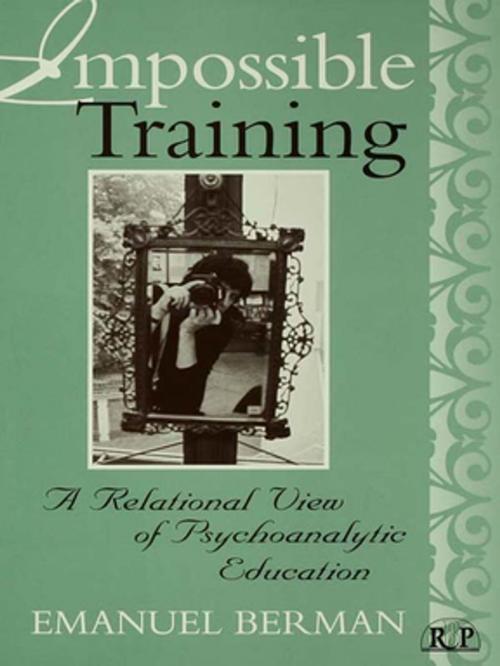Impossible Training
A Relational View of Psychoanalytic Education
Nonfiction, Health & Well Being, Psychology, Psychoanalysis, Applied Psychology, Mental Health| Author: | Emanuel Berman | ISBN: | 9781135061760 |
| Publisher: | Taylor and Francis | Publication: | April 15, 2013 |
| Imprint: | Routledge | Language: | English |
| Author: | Emanuel Berman |
| ISBN: | 9781135061760 |
| Publisher: | Taylor and Francis |
| Publication: | April 15, 2013 |
| Imprint: | Routledge |
| Language: | English |
Over the past century psychoanalysis has gone on to establish training institutes, professional societies, accreditation procedures, and models of education, thus bringing into uneasy alliance all three impossible pursuits. In Impossible Training: A Relational View of Psychoanalytic Education, Emanuel Berman turns his attention to the current status and future prospects of this daunting project.
Berman is ideally suited to tackle the impossibility of psychoanalytic education. A graduate of two psychoanalytic institutes, one in Israel and one in America, he has devoted much of his professional life to psychoanalytic education and the organizational issues embedded in it. In Impossible Training, Berman describes the complex emotional and organizational dynamics of psychoanalytic training. Placing these issues within the context of major controversies in psychoanalytic history, he shows how generations of students have either idealized a "proper analytic identity," which evolves into a persecutory ideal, or rebelled against these standards. Are such persecuting and infantilizing trends inherent in analytic training, he asks, or can psychoanalytic education transcend them through changes in its structure and rules?
For Berman, the relational and intersubjective trends in contemporary psychoanalysis call for changes in analytic supervision, not least of which is heightened attentiveness to the many relationships that gain expression in the supervisory process. Envisioned in this relational manner, supervision can become a more personal experience, less guarded, and more conducive to the development of a fertile transitional space between supervisor and supervisee. Anchoring his consideration of the present in the controversies of the past, Berman concludes by considering the mission of psychoanalytic educators today: to provide trainees with the resources to cope creatively with the as yet unknown challenges of tomorrow.
Over the past century psychoanalysis has gone on to establish training institutes, professional societies, accreditation procedures, and models of education, thus bringing into uneasy alliance all three impossible pursuits. In Impossible Training: A Relational View of Psychoanalytic Education, Emanuel Berman turns his attention to the current status and future prospects of this daunting project.
Berman is ideally suited to tackle the impossibility of psychoanalytic education. A graduate of two psychoanalytic institutes, one in Israel and one in America, he has devoted much of his professional life to psychoanalytic education and the organizational issues embedded in it. In Impossible Training, Berman describes the complex emotional and organizational dynamics of psychoanalytic training. Placing these issues within the context of major controversies in psychoanalytic history, he shows how generations of students have either idealized a "proper analytic identity," which evolves into a persecutory ideal, or rebelled against these standards. Are such persecuting and infantilizing trends inherent in analytic training, he asks, or can psychoanalytic education transcend them through changes in its structure and rules?
For Berman, the relational and intersubjective trends in contemporary psychoanalysis call for changes in analytic supervision, not least of which is heightened attentiveness to the many relationships that gain expression in the supervisory process. Envisioned in this relational manner, supervision can become a more personal experience, less guarded, and more conducive to the development of a fertile transitional space between supervisor and supervisee. Anchoring his consideration of the present in the controversies of the past, Berman concludes by considering the mission of psychoanalytic educators today: to provide trainees with the resources to cope creatively with the as yet unknown challenges of tomorrow.















